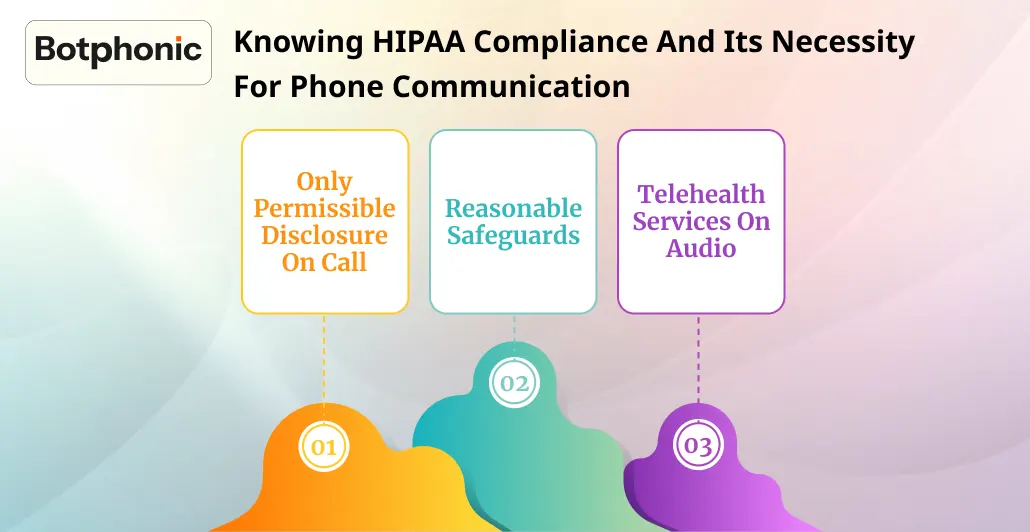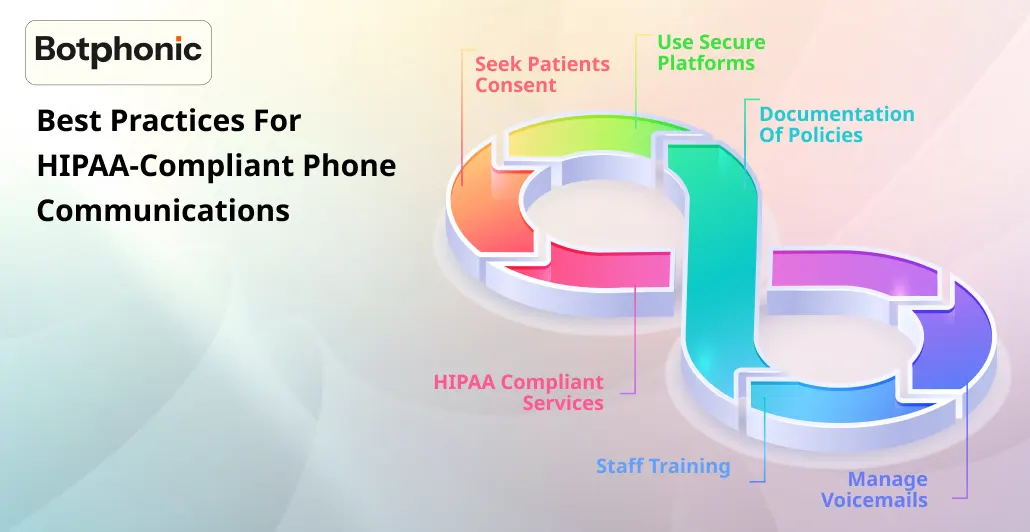
Summarize Content With:
Summary
In the landscape of healthcare a single unprotected call can mean violation of HIPAA rules. This text will help you explore what HIPAA compliance means and how you can comply with these rules for better patient safety.
Introduction
In the world of healthcare, AI has been potentially playing a role which cannot be neglected. AI call assistants have paved alternate ways to assist patients effectively from booking appointments to getting answers. But along with the benefits comes the fear of privacy of data. So what can be done? These calls have been protected through HIPAA law. It ensures that sensitive calls in healthcare settings have been secured.
Hence providers like Botphonic AI ensure compliance to the HIPAA standard in their call center solutions. It is a moral necessity to gain the trust and confidence of your patients. This content will help you know what HIPAA is and its importance in the field of healthcare contact centers. Let’s try to understand different aspects and needs to secure HIPAA‑sensitive calls in healthcare.
Knowing HIPAA compliance and its necessity for phone communication

HIPAA is an abbreviation for Health Insurance Portability and Accountability Act. It is a federal law that was designed and accomplished by the United States to make sure that patient data is safe. Hence as it is mentioned, it sets rules for protecting data of users. Organizations that access and store patient data have to ensure that necessary network and security measures are in place.
There are certain companies that outsource call center services for managing patient inquiries and sensitive data while following HIPAA regulations. Not only over calls but it guarantees the safety of data over multiple forms of communication.
Here’s what more you need to know:
1. Only permissible disclosure on call
HIPAA sets boundaries that only certain patient health data can be disclosed over phone calls. It has a set of rules which allow disclosure of certain information before asking for a patient in only certain cases. Healthcare specialists, insurance agents and data processors must safeguard information over any form of communication.
Information can only be shared without the patient’s consent when it is necessary for treatment. While you share this information make sure it is protected and not disclosed publicly.
2. Reasonable safeguards
When a provider has to disclose the patient’s health information they have to undertake safety measures. They must initially verify the identity of the person they are speaking to before informing about the data. Also they must conduct conversation privately or in a lower voice to avoid someone overheating sensitive patient data.
For example, if a doctor has to talk to a specialist about a patient’s health condition, go to a quiet place or speak in a low voice.
Another necessary rule is to only disclose necessary information and not more than that strictly.
3. Telehealth services on audio
HIPAA lets healthcare specialists use audio only for telehealth services. But be aware as the rules will depend on the technology used. If the call is made through mobile apps or VoIP HIPAA security rules have to be followed. It is to protect the electronic protected health information for patient safety.
But if the call is made through landlines the security rules don’t apply. Privacy rules of HIPAA still remain the same. Patients can receive calls through AI call assistants from any mode but providers might ensure that the patient data is safe and secure.
What if your phone calls don’t comply with HIPAA?
If your AI contact center software does not comply with the standards of HIPAA it could be a problematic situation. The first consequence can be a good amount of penalty which comprises both civil and criminal no matter which medium mishandles it.
The penalties are divided into different levels as per the nature and level of violation and level of culpability.
Civil penalties and their fine are divided into four tiers:
Tier 1: This level of violation occurs when the business owner was unaware of it and could not have possibly avoided it. Penalties can vary from $141 to 35, 581 per violation.
Tier 2: It is applicable when the violation has happened due to certain cause but not due to negligence. Penalties can start from $1, 424 and increase up to $71,162 per violation.
Tier 3: This tier is for violations that have been caused due to negligence but is then corrected within a month. The penalties can vary from $14, 232 to $71,162.
Tier 4: It is the case of willingful violation where it has not been corrected in a month. The penalties can start from $71,162 and increase up to $2,134,831 per violation.
In certain cases violation of these rules can also be criminal. Hence the penalties can be more than the above mentioned ones and the person might have to spend time in prison. Jail time can be between one to ten years.
Fix it before it costs you.
Secure your calls now with BotphonicBest practices for HIPAA-compliant phone communications

From the above mentioned details you might now be aware of how crucial it is to maintain HIPAA compliance. It is to be extra taken care of while AI based contact center software communicates over call. It not only questions the privacy of users but can lead to huge penalties.
Hence here’s a list of ways in which you can avoid non-compliance to HIPAA standards:
1. Seek patients consent
The first step to make sure you are on the right path is to ask for patients’ consent. It is the primary requirement for HIPAA compliance for AI voice assistant. The type of consent may vary between explicit and implicit.
If the patient agrees on providing a phone number that means you have consent for sending texts or calls for healthcare purposes. You can send them reminders or test reports. But it is still necessary to inform patients that they will receive output or data on their given numbers.
2. HIPAA compliant services
You must use appropriate communication services that comply with HIPAA for protecting patient health information. Phone services that ensure end to end encryption and secure data transmission can be a great choice.
When you are using a third party provider make sure to sign a contract in which they mention to comply with these rules.
3. Manage voicemails
It is possible for any person to gain easy access to voicemails and messages. Hence with this form of communication it is hard to comply with HIPAA rules.
Hence when you leave a voicemail mention limited information such as you can request a callback. Never send patient information through SMS from an unsecure platform. And if it’s necessary choose ones that are secure.
4. Staff training
One of the best ways to ensure HIPAA compliance is informing staff regarding the requirements. Also mention how they have to behave to abide by these rules. Here’s what you can do:
Conduct training sessions on HIPAA rules
Inform about verification procedures
Teach secure communication protocols
Impart knowledge based on case studies and examples
Educating your staff in the right manner and teaching them how to use healthcare call center software can lessen the risks of non-compliance.
5. Documentation of policies
Maintaining comprehensive documentation to showcase the compliance and accountability to HIPAA rules is necessary.
Set rules and create documentation on how to communicate over phone calls. It can include identifying identity, sending a voicemail and using secure tools. Make sure that these guidelines are available to staff in written form so that they could behave in a certain fashion.
6. Use secure platforms
It is very crucial to maintain security of HIPAA sensitive calls to protect patient data. Hence technology plays a crucial role in securing phone calls by offering solutions that improve security.
Botphonic AI is a customer centric call center software solution provider which provides exceptional features for security. It complies to HIPAA rules and safeguards patient information. It also has end-to-end encryption to make sure that phone communications are securely transmitted. Hence this level of security measures are necessary for voice call AI with EHR software to comply with HIPAA rules.
Conclusion
Securing HIPAA sensitive calls is not just a matter of requirement but a crucial step in protecting the privacy of patient data. It is a step that assures that you secure the trust and confidentiality of patient health information. No matter if the communication takes place over landline or digital solutions, healthcare providers should follow safety guidelines.
One must share only what’s necessary and that too only after verifying identity. With the increasing use of AI call assistants and telehealth, it is necessary to maintain compliance with HIPAA. It can only be possible by combining smart technology with privacy conscious providers. No matter how interaction happens, patient data should be safe and secure.

